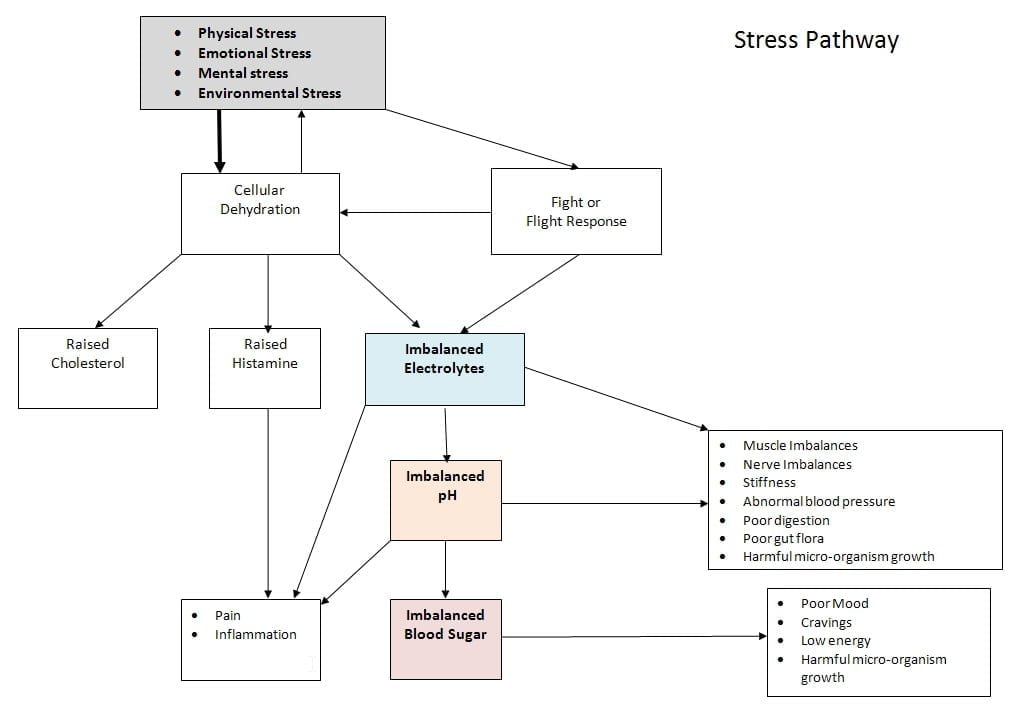
We all know that stress can cause ailments such as difficulty sleeping, muscle tension, changes in appetite, headaches, stomach problems, panic attacks, and prolonged feeling of sadness or worthlessness. But did you also know that stress can literally alter the cells in our body and lead to chronic inflammation and serious diseases? Prolonged, overexposure to cortisol and other stress hormones can wreak havoc on the mind and body. Chronic stress can reprogram the cells in our body and disrupt all of its processes.
A region at the base of our brain, the hypothalamus, is set off in the presence of a perceived threat. In turn, this signals the pituitary and adrenal glands to release a surge of hormones, including adrenaline and cortisol. Cortisol is the main hormone responsible for stress response and releases glucose into the bloodstream, enables the brain to utilize this sugar release, and help release substances that repair the body’s tissues.
This vital process triggers our body’s fight or flight reactions. In the presence of chronic stress, this response remains turned on decreasing tissue sensitivity to the hormone and altering its ability to regulate inflammation. As we’ve learned in previous postings, chronic inflammation can set off a whirlwind of disaster furthering current or promoting the development of disease.
Stress and Cardiovascular Disease
When stress is triggered, cortisol constricts the blood vessels and increases blood pressure in order to deliver more oxygen to the blood. This is another healthy and necessary reaction, but not when it is perpetually stimulated. Constant constriction of the vessels can lead to damage and plaque, in turn, the possibility of a heart attack.
Chronic Stress, Weight Gain, and Type 2 Diabetes
During stressful situations cortisol taps into the body’s protein storages and provides the body with glucose. This energy source aids in stressor fight or flight response. What could happen in the presence of chronic stress and consistently high blood sugar levels?
A main function of cortisol is to impede the effect of insulin rendering our cells insulin resistant. If cortisol remains continually elevated, so does our insulin resistant state. The pancreas can only keep up with this intense demand for insulin for so long and when these glucose levels remain high in the blood, our cells become starved of the sugar they need. These cells are also now starved of energy which can send out hunger signals to the brain.
These misfiring cues often stimulate cravings for high-calorie foods and easily lead to overeating. On top of it all, unutilized glucose is stored as body fat. Essentially, unchecked chronic stress can lead to weight gain, obesity, and Type 2 Diabetes.
The Suppression of the Immune System
Stress is not always a bad thing. Cortisol aims to reduce the inflammation in the body. However, prolonged cortisol release can also suppress the immune system. When the immune system is subjected to incessant inflammation, the systems of the body fail to communicate. When the organs and functions of the body are no longer working together you are placed at a much higher risk for a multitude of serious health conditions ranging from elevated cold and flu susceptibility to something as critical as Cancer development.
Chronic Stress and Gastrointestinal Complications
A cortisol-inundated, stressed body compromises digestion and nutrient absorption and indigestion ensues. The mucosal lining becomes irritated and inflamed placing you at risk for Ulcers, Colitis, IBS and digestion impaired conditions. Close to 80% of the immune system resides in the digestive tract. These systems are completely dependent on one another. Probiotics are one way to combat these acids, but ultimately relieving the stress causing it remains key.
Stress, Joint Health and Chronic Pain
Stress can cause quite a bit of muscle tension creating even more pain for those suffering with joint problems such as Arthritis. Stress is also very acidic to the body, stripping vital nutrients such as Vitamin B5. B5 helps the body to excrete excess Uric Acid posing a much higher risk for Gout suffers to experience an attack during stressful times in their life. Acidic and Alkaline (pH) balance is crucial to controlling, or avoiding, all sorts of health conditions.
Our emotional state has a direct affect on the pH level in our body, even to the point where positive feelings of joy and laughter can actually produce alkaline conditions. Unabated stress can cause a myriad of problems, as you can see. If you combine the negative, acidic emotions with an acidic diet and physical stress, one can trigger inevitable health consequences.
Stress management is crucial to your health and can be controlled with a balanced diet, plenty of water, sleep, exercise, meditation, aromatherapy, getting outside, communication, music, a good book, vitamins and supplements. Do not ignore stress, your life and livelihood depend on your attention to this matter.

More about Stress and Your Health: Click here





Leave a Reply